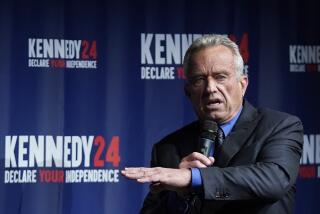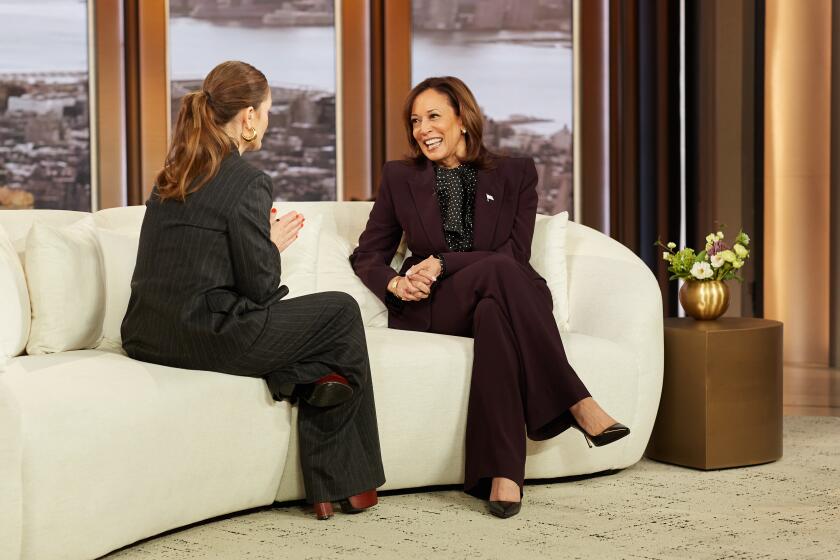Obama’s first year: A good start if only a start
With his poll numbers shrinking and pending healthcare legislation more controversial than ever, President Obama’s critics are celebrating his much-diminished presidency.
And if unemployment numbers don’t improve, the president may not just be a diminished president but a finished one.
Still, Barack Obama will today complete one of the more successful first years of any modern president. Love him or hate him, Obama has demonstrated that he can be both president and presidential in the face of some galactic challenges.
And if his competence (and luck) hold and he learns how not to overreach, who knows? Obama may well emerge down the road as one of America’s better presidents.
Obama’s critics on the left and right, and a good many people in between, clearly don’t see it that way. For them, he’s both a threat and a disappointment. The president has validated Republicans’ worst fears about big government, and he’s betrayed his base’s dreams for real reform. For both, Obama has emerged as a kind of empty suit, long on rhetoric, short on action, with a set of confused priorities that are driving the nation deeper into debt.
But like a judge in platform diving at the Olympics, any fair and honest evaluator of the president’s first year needs to take into account the degree of difficulty of the dive.
Obama surely didn’t inherit the nation-threatening crises of Lincoln or FDR. But the circumstances he confronted were certainly worse than any of his immediate predecessors -- deep recession at home and two costly wars abroad.
By any reasonable standard (except that of a significant number of Republicans, who see him as Satan’s finger on Earth no matter what the issue), he’s done pretty well and then some.
His policies, to be sure, are mostly incomplete, with all the attendant uncertainties and questions. He is indeed still the question-mark president: Will the Afghan surge produce enough stability to allow the U.S. an exit, and by when? Will the economic stimulus and jobs packages produce economic growth and reduce unemployment? And will his signature accomplishment -- healthcare -- even pass, let alone expand coverage, improve care and reduce costs without bankrupting the country?
The fact is, we just don’t know the answers yet. What we do know is that Obama has worked hard to juggle, manage, experiment and just maybe set in motion what the great sociologist Max Weber described as “proximate solutions to insoluble problems.” The president has stopped the economic bleeding and the panic of recession, stabilized and moved to reform the financial sector, and gone farther and faster on healthcare than any of his predecessors.
Abroad, his policies are also works in progress. It’s a cruel irony that the Nobel Peace Prize president may spend more of his time as a war leader in Afghanistan, Iraq and against Al Qaeda. And it’s by no means clear that his multilateral diplomacy will generate the kind of leverage and support from others to deal with difficult challenges such as curbing Iran’s nuclear program or promoting Arab-Israeli peace. After eight years of no diplomacy, however, it’s worth a try.
Indeed, the president does well on the international stage. He’s emerged as the well-spoken Energizer Bunny of American diplomacy. Today he’s in Oslo for the Nobel; tomorrow he’s in Copenhagen for climate change; yesterday he’s in Cairo reaching out to the Arabs and Muslims; and the day before he’s in Moscow doing arms control with the Russians.
To millions of Americans without jobs, and millions more worried about debt, foreclosure and deficits, none of this diplomacy means much. But Americans should still like to see their president being presidential abroad. And the president’s orchestration of relief to victims of the recent earthquake in Haiti makes Americans feel proud. Indeed, it’s critical in tough times that the president appear in charge and that he be presidential as persuader-, reassurer- and consoler-in-chief both abroad and at home.
Obama is out there (everywhere) in the face of crisis, trying to restore confidence until the economy improves.
Our greatest presidents (Washington, Lincoln and FDR, I would argue) were both transactors and transformers. They addressed the crisis at hand, left the nation stronger and created a legacy on some big political, economic or social issue that changed America for the better and forever.
Obama aspires to be one of those. As the first African American president, he looks to Lincoln; inheriting the worst economic crisis since the Depression, he draws a line to FDR; and on the verge of pushing through huge healthcare reform, he sees LBJ (the master legislator) in the rearview mirror. If this isn’t the behavior of a guy who sees himself as a historic figure, what is?
And herein lies the problem: A president who wants to be transformational is trapped in a dysfunctional political system of oppositional Republicans, unruly Democrats and overly grandiose goals of his own making. He has no large Roosevelt or Reagan coalitions to support him; no martyred predecessor to unite the nation; no nation-wrenching crisis that compels the public to accept bold change and follow his lead.
A year in, Obama may well be coming to realize that while politics is about what people want, governance is about what they get. And maybe, for a high-minded, ambitious and overly confident (even arrogant, at times) Barack Obama, this isn’t such a bad thing for him -- and for us.
Aaron Miller, a public policy scholar at the Woodrow Wilson International Center for Scholars, is the author of “The Much Too Promised Land: America’s Elusive Search for Arab-Israeli Peace.” His book “Can America Have Another Great President?” will be published in 2012.
More to Read
Get the L.A. Times Politics newsletter
Deeply reported insights into legislation, politics and policy from Sacramento, Washington and beyond. In your inbox three times per week.
You may occasionally receive promotional content from the Los Angeles Times.






